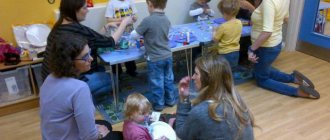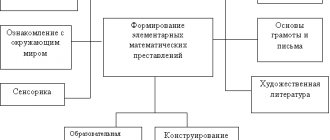Social and communicative development in a preschool institution
Natalia Kulevaa
Social and communicative development in a preschool institution
The social and communicative development of a child is a process through which he learns to establish and maintain the necessary contacts with the outside world and people.
The main goal of this direction is the positive socialization of preschool children , introducing them to sociocultural norms , traditions of the family, society and state.
Objectives of the social and communicative development of preschool children according to the Federal State Educational Standard :
— assimilation of norms and values accepted in society, including moral and moral values;
- development of communication and interaction of the child with adults and peers;
- formation of independence, purposefulness and self-regulation of one’s own actions;
-development of social and emotional intelligence, emotional responsiveness, empathy, formation of readiness for joint activities with peers, formation of a respectful attitude and a sense of belonging to one’s family and to the community of children and adults in the Organization;
-formation of positive attitudes towards various types of work and creativity; formation of the foundations of safe behavior in everyday life, society , and nature.
The social and communicative development of children is one of the most important problems of pedagogy. Its relevance is increasing in modern conditions due to the peculiarities of the child’s social environment , in which there is often a lack of good manners, kindness, goodwill, and speech culture in people’s relationships.
The task of the teachers of our preschool department is to ensure that our graduates in the future, when they go to school, enter a university or get a job, do not experience difficulties in communicating with other people and become full-fledged members of society, showing initiative and independence, and are confident in in his own strengths, open to the outside world, has a positive attitude towards himself and others, and has a developed imagination .
Work experience shows that it is important to develop in preschoolers the ability to build relationships with others on the basis of cooperation and mutual understanding, to ensure general mental development , to form the prerequisites for educational activities and qualities necessary for adaptation to school and successful learning in primary school.
The activities of teachers in our preschool institution to provide the necessary conditions for the social and communicative development of children include:
• organization of the subject-spatial environment;
• creating situations of communicative success for children;
• stimulating children's communicative activities, including using problem situations;
• eliminating communication difficulties in children in collaboration with an educational psychologist and with the support of parents;
• motivating the child to express his thoughts, feelings, emotions, character traits using verbal and non-verbal means of communication;
• ensuring a balance between educational activities under the guidance of a teacher and independent activities of children;
• modeling of game situations that motivate a preschooler to communicate with adults and peers.
The main forms of activity for the social and communicative development of preschool children : group, subgroup and individual, which are carried out in direct educational activities (DEA, in the daily routine and in the independent activities of children.
Planning of educational situations is carried out in accordance with the curriculum and theme of the week, taking into account the principle of seasonality.
For the social and communicative development of preschool children, not only play is of great importance. Classes, conversations, exercises, getting to know music, reading books, observing, discussing various situations, encouraging mutual assistance and cooperation of children, their moral actions - all this becomes the building blocks that make up a person’s personality.
Educational field " Social and communicative development "
is implemented in 4 directions:
Development of play activities, patriotic education, formation of the foundations of safe behavior in everyday life, society , nature, labor education.
Development of children's play activities (slide)
Play is the main activity of preschool . And our task is to correctly and skillfully help children acquire the necessary social skills .
Play gives children the opportunity to reproduce the adult world and participate in an imaginary social life . Children learn to resolve conflicts, express emotions and interact appropriately with others.
Our preschool use a wide range of different games. To establish dialogical communication, board-printed, didactic games, and games with rules are used. Role-playing games.
The next direction of implementation of the NGO “ Social and communicative development ”
is patriotic education.
(slide)
• To foster in a child love and affection for his family, home, kindergarten, street, city;
• Develop a caring attitude towards nature and all living things;
• Foster respect for work;
• Develop interest in Russian traditions and crafts;
• Develop basic knowledge about human rights;
• Expand ideas about Russian cities;
• Introduce children to the symbols of the state (coat of arms, flag, anthem)
;
• Develop a sense of responsibility and pride for the country's achievements;
• To develop tolerance, a sense of respect for other peoples and their traditions.
These tasks in our preschool educational institution are solved in all types of children's activities: in classes, holidays and entertainment , in games, in work, in everyday life - since it is necessary to cultivate in a child not only patriotic feelings, but also to form his relationships with adults and peers.
The next direction of implementation of the NGO “ Social and communicative development ”
is the formation of the foundations of safe behavior in everyday life,
society , and nature. (slide)
Developing safe behavior skills in children is carried out on the basis of the child’s desire to explore the world around him, using his curiosity, visual-figurative thinking and spontaneity of perception. Priority is given to individual and subgroup forms of work with children.
This work is carried out through:
• organized activities for children - classes, excursions, trainings;
• joint activities of adults and children - dramatization of fairy tales, conversations between teacher and child, observations, work, reading fiction;
• free independent activity of children - role-playing games.
The main content of the educational activities of our preschool institution to develop safe behavior skills in children within the framework of the implementation of the Federal State Educational Standard is the development of projects, such as “travel literacy”
,
“my health”
,
“indoor safety”
,
“safety and nature”
,
“communication with strangers”
.
The main goal of which is to expand the understanding of pupils that safety depends on themselves, on compliance with certain rules (hygienic, traffic, life in a team, on the ability to anticipate and avoid possible danger).
When introducing children to works of art, the teacher draws attention to the need to be able to take the position of another person; choose socially acceptable line of behavior in a given situation; encourage manifestations of mutual assistance and mutual assistance among peers.”
The next direction of social and communicative
development is (slide)
Labor education
The main goal of labor education of preschool children is the formation of the child’s personality, as well as the correct attitude towards work. Labor develops a preschooler's intelligence , observation, attention, concentration, memory, and also strengthens his physical strength and health.
Foster positive relationships between children during work - the ability to work in a team, provide assistance if necessary, favorably evaluate the work of peers and make comments in a respectful manner.
4. Interaction with family. (slide)
Also, our teaching team builds its work on raising and teaching children in close contact with the family, involving parents in the life of the kindergarten.
Preschool educational institutions use various forms of work with parents:
-involving parents in organizing children’s activities in preschool educational institutions;
-open days for parents;
-questioning of parents;
-consultations for parents;
-parent meetings;
-design of parent corners, mobile folders, exhibitions for parents.
Constant, continuous work in all 4 areas of this public organization contributes to the social and communicative development of each child . Children become more liberated and independent, purposeful and self-confident, sociable, more attentive and caring towards peers and adults; capable of mutual understanding and cooperation. Children develop the ability to jointly make decisions and follow their implementation.
Preschool teachers work in close collaboration with kindergarten specialists: speech therapist, music director, physical education instructor, speech pathologist, psychologist, which helps to more successfully carry out educational work with preschoolers on the formation of social and communication skills . A joint analysis of programs, technologies, and problematic situations of training and education is carried out.
The social and communicative development of a child is a complex process, as a result of which he learns to establish and maintain the necessary contacts with the outside world and people.
It is this that underlies the formation of a person’s communicative competence in the future, which represents the entire set of skills, abilities and knowledge that allow one to adequately perceive and respond to the surrounding reality in the process of communication.
We can say with complete confidence that the process of acquiring communicative competence is long and difficult, from which it follows that it is necessary to begin developing a child in this direction from an early age.
Problems for modern children
A similar problem is increasingly manifested in the modern world, where already a 2-3-year-old child prefers computer games to communication, and watching TV to group games. Thanks to this, he is deprived of the opportunity to develop communication skills, and this, in turn, not only causes a lack of communication itself, but also great difficulties in the process of socialization. As a result, a situation arises in which a child leaving for school is simply unable to communicate with peers - they seem strangers to him, he does not know how to play with them, and does not know what to talk about. If someone offends such a child, he withdraws even more and moves away. In real life, teachers have no time to understand the details of such a conflict, so they make a superficial conclusion - since this child is not able to communicate and make friends, then he is ill-mannered and bad. Analyzing the modern social development of preschool children, we can notice some typical features.
- No matter how the family, society and the world change, preschoolers remain children who love to play, although the content of these games has changed: computer games, modern construction sets and puzzles have been added to role-playing games.
- In the intellectual sphere, children have undergone significant changes - with their curiosity, they have become more informed, they can cope with modern technology very quickly, and they navigate more easily even in adult life thanks to the information saturation at home and in kindergarten.
- There are changes in the social, personal and moral development of children, their communication and behavior.
The problem is actually not that there is something wrong with the child, but that he was not shown, he was not taught how to properly build relationships with peers and how to communicate with them. Since the child does not know how to do this, he avoids everyone, and sometimes he himself causes conflict. Such incidents at such an early age inevitably leave an imprint on the child’s psyche and the formation of his personality. Such a child has little chance of growing up to be a sociable, cheerful, self-confident person, which is a direct path to problems in his personal life and work life. Therefore, it is necessary to understand what children’s social and communicative development is, how to prepare for it correctly and equip the child with the necessary communication skills.



